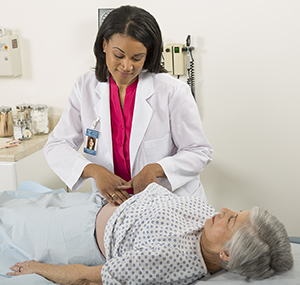Abdominal Pain
Abdominal Pain
Abdominal pain is pain in the stomach or belly area. Everyone has this pain from time to time. In many cases it goes away on its own. But abdominal pain can sometimes be due to a serious problem, such as appendicitis. So it’s important to know when to seek help.
Causes of abdominal pain
There are many possible causes of abdominal pain. Common causes in adults include:
Constipation, diarrhea, or gas
Stomach acid flowing back up into the esophagus (acid reflux or heartburn)
Severe acid reflux, called GERD (gastroesophageal reflux disease)
A sore in the lining of the stomach or small intestine (peptic ulcer)
Inflammation of the gallbladder, liver, or pancreas
Gallstones or kidney stones
Appendicitis
Intestinal blockage
An internal organ pushing through a muscle or other tissue (hernia)
Urinary tract infections
In women, menstrual cramps, fibroids, or endometriosis
Inflammation or infection of the intestines
Diagnosing the cause of abdominal pain
Your healthcare provider will do a physical exam help find the cause of your pain. If needed, tests will be ordered. Belly pain has many possible causes. So it can be hard to find the reason for your pain. Giving details about your pain can help. Tell your provider where and when you feel the pain, and what makes it better or worse. Also let your provider know if you have other symptoms such as:
Fever
Tiredness
Upset stomach (nausea)
Vomiting
Changes in bathroom habits
Treating abdominal pain
Some causes of pain need emergency medical treatment right away. These include appendicitis or a bowel blockage. Other problems can be treated with rest, fluids, or medicines. Your healthcare provider can give you specific instructions for treatment or self-care based on what is causing your pain.
If you have vomiting or diarrhea, sip water or other clear fluids. When you are ready to eat solid foods again, start with small amounts of easy-to-digest, low-fat foods. These include apple sauce, toast, or crackers.
When to seek medical care
Call 911 or go to the hospital right away if you:
Can’t pass stool and are vomiting
Are vomiting blood or have bloody diarrhea or black, tarry diarrhea
Have chest, neck, or shoulder pain
Feel like you might pass out
Have pain in your shoulder blades with nausea
Have sudden, severe belly pain
Have new, severe pain unlike any you have felt before
Have a belly that is rigid, hard, and tender to touch
Call your healthcare provider if you have:
Pain for more than 5 days
Bloating for more than 2 days
Diarrhea for more than 5 days
A fever of 100.4°F (38°C) or higher, or as directed by your healthcare provider
Pain that gets worse
Weight loss for no reason
Continued lack of appetite
Blood in your stool
How to prevent abdominal pain
Here are some tips to help prevent abdominal pain:
Eat smaller amounts of food at one time.
Avoid greasy, fried, or other high-fat foods.
Avoid foods that give you gas.
Exercise regularly.
Drink plenty of fluids.
To help prevent GERD symptoms:
Quit smoking.
Reduce alcohol and certain foods that increase stomach acid.
Avoid aspirin and over-the-counter pain and fever medicines (NSAIDS or nonsteroidal anti-inflammatory drugs), if possible
Lose extra weight.
Finish eating at least 2 hours before you go to bed or lie down.
Raise the head of your bed.
Updated:
September 02, 2017
Sources:
Diagnostic Approach to Abdominal Pain in Adults, UpToDate, Evaluation of Acute Abdominal Pain in Adults. Cartwright, S. American Family Physician. 2008, is. 77, ed. 7, pp. s971-78., Pathophysiology and Treatment of Fever in Adults. UpToDate.
Reviewed By:
Fraser, Marianne, MSN, RN,Lehrer, Jenifer, MD
